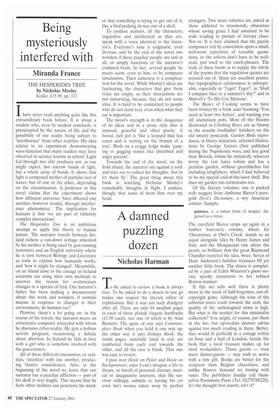A damned puzzling dozen
Nicholas Harman
To be asked to review a book is always nice. To be asked to do a dozen in one go makes one suspect the literary editor of exploitation. But it was not such drudgery after all. There are only 64 smallish pages in each of these plainly elegant hardbacks (f1.50 each), not one of which is by Alan Bennett. The spine of one says Commonplace Book when you hold it one way up, the other way it says Holiday Book, the inside pages, tastefully lined in red, are numbered from each end towards the other, and all the rest is blank. That one was easy to review.
I pass over Hoyle on Poker and Hoyle on Backgammon, since I can't imagine a life so dreary, so bereft of personal, literary, musical or imaginative interests, that the survivor willingly submits to having his (or even her) money taken away by perfect strangers. Two more volumes are aimed at those addicted to crosswords, obsessives whose saving grace I had assumed to be wide reading in pursuit of literary clues. Not so. It is here claimed that the puzzle composers rely by convention upon a small, well-worn repertoire of reusable quotations, so the solvers don't have to be wellread, just used to the catch-phrases. The trick of these books is to supply the whole of the poems that the regulation quotes are wrested out of. Many are excellent poems, but typographical carelessness is unforgivable, especially in `Tyger! Tyger!', in 'Shall I compare thee to a summer's day?' and in Marvell's 'To His Coy Mistress'.
The Basics of Cooking seems to have been written by a brisk aunt booming 'You need at least two knives', and warning you off aluminium pots. Most of the blooms illustrated in Climbing Roses are as blowsy as the seaside landladies' knickers on the old smutty postcards. Garden Birds reproduces, in blurry miniature, selected illustrations by George Graves (first published during the Napoleonic wars, and less good than Bewick, whom he imitated); whoever wrote the text hates robins and has a peculiar garden, without greenfinches but including kingfishers, which I had believed to be my special end-of-the-lawn thrill. But then my garden has cormorants too.
Of the literary volumes, one is packed with nuggets from Ambrose Bierce's puregold Devil's Dictionary, a wry American sottisier. Sample:
patience, n. a minor form of despair, disguised as a virtue.
The excellent Bierce crops up again in a further four-story volume, where his 'Occurrence at Owl's Creek' stands as an equal alongside tales by Henry James and Saki, and the Maupassant one about the pearls, so brilliant that the great Raymond Chandler recycled the idea, twice. Seven of Hans Andersen's familiar treasures fill yet another little book. The dozen is completed by a pair of Edith Wharton's ghost stories, spooky miniatures in her refined Boston manner.
If this set sells well there is plenty more in the stock of half-forgotten, out-ofcopyright gems. Although the tone of the editorial notes tends towards the arch, the quality of the anthologised items is high. But what is the market for this minimalist collection? You might, of course, put them in the loo, but up-to-date doctors advise against too much reading in there. Better, they would fit perfectly in a cottage within an hour and a half of London, beside the beds that a local treasure makes up for tired weekenders. Those guests — even mere dinner-guests — may wish to arrive with a tiny gift. Books are better for the recipient than Belgian chocolates, and unlike flowers demand no fussing with vases. The publishers frankly call themselves Parsimony Press (Tel: 01278788220). It's the thought that counts, isn't it?






















































































 Previous page
Previous page